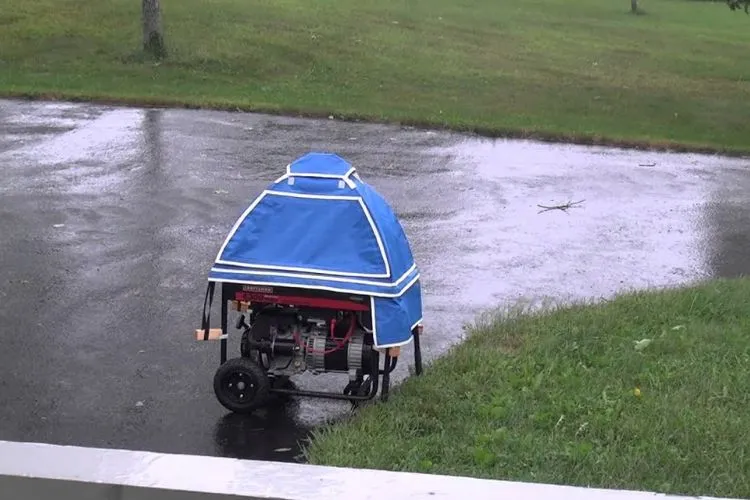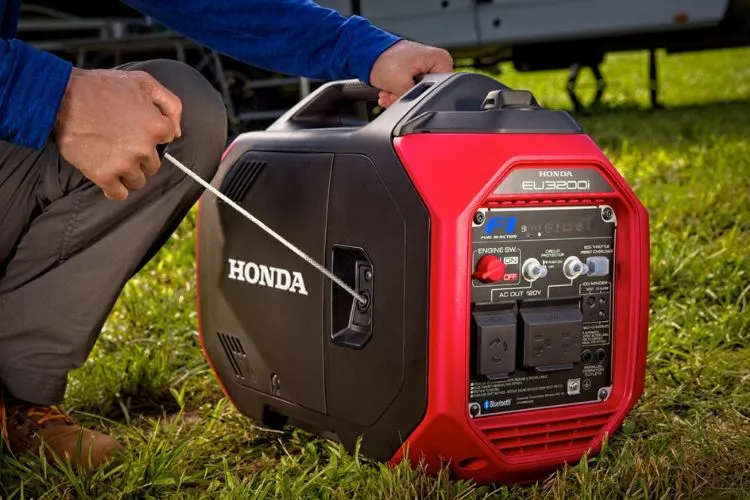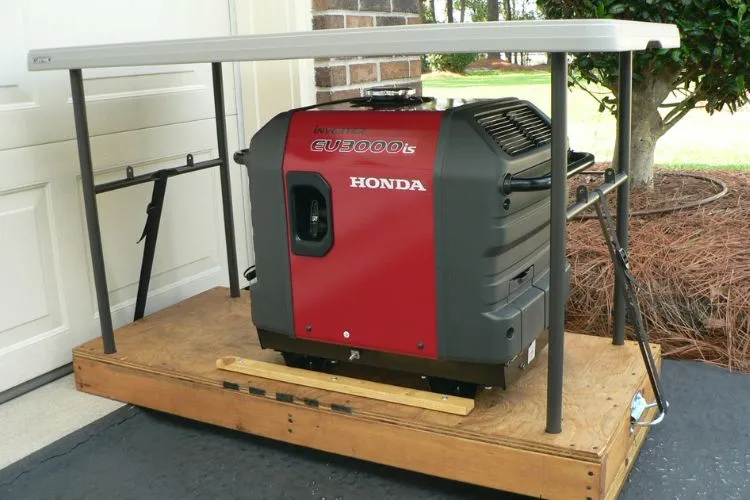When it comes to operating generators, safety is paramount. The mix of electricity and water can create hazards, including electrical shocks and short circuits.
But, can you run a generator in the rain?
Many wonder if it’s safe to run generators in the rain.
This article aims to answer that question, focusing on safety precautions and proper use during wet conditions.

Understanding Generators and Weather Challenges
Generators convert mechanical energy into electrical power, providing electricity where it’s not available.
However, when weather conditions turn sour, especially with rain, using a generator becomes tricky.
The primary risks include electrical hazards, the potential for a short circuit, and possible damage to the generator itself.
It’s crucial to consider the manufacturer’s recommendations regarding weather conditions and generator use.
Can You Run A Generator In The Rain?
Running a generator in the rain raises significant safety concerns. Manufacturers and safety codes, such as the National Electric Code, advise against using generators in wet conditions to avoid electric shock and damage.
Generally, it’s not recommended to run generators in the rain without proper precautions.
Safety Precautions and Measures

Preparing for Safe Operation in Wet Conditions
To use a generator in wet conditions safely, a protective cover or canopy is essential. The cover must ensure adequate ventilation to prevent carbon monoxide (CO) buildup, posing a risk of CO poisoning.
Ventilation is critical for safety, allowing exhaust gases to disperse.
Grounding Your Generator
Grounding the generator helps prevent electric shocks. This process involves connecting the generator to a grounding rod, creating a safe path for excess electricity to travel to the ground. Proper grounding is a crucial safety step in any condition.
Electrical Safety Tips
When a generator is wet, avoid direct contact. Use weatherproof extension cords and outlets to minimize the risk of electric shocks.
Before using a generator in adverse weather, perform routine maintenance checks, ensuring it’s in good working order.
Alternative Solutions and Safety Innovations
Weatherproof generator models are designed to withstand adverse weather, offering a safer option.
Portable generator tents and enclosures provide alternatives, allowing use during rain while ensuring protection and proper ventilation.
Generator technology innovations continue to improve safety for operation in all weather conditions.
Pro Tips
Understanding your generator’s limitations and how to protect it from the rain is critical for safe operation. Investing in a carbon monoxide detector adds an extra safety layer.
Regular inspections for wear and tear, especially after exposure to harsh weather, can prevent accidents and extend your generator’s life.
By staying informed and prepared, you can safely use your generator, rain or shine.

Professional Recommendations
Industry professionals and electrical safety organizations universally stress the importance of caution when operating generators in rainy or wet conditions.
Their advice centers around safety-first practices to mitigate risks of electrocution, equipment damage, and carbon monoxide poisoning. Key recommendations include:
- Proper Placement: Always place the generator on a dry, stable surface, preferably under a canopy or custom cover that allows for ample airflow while protecting the unit from direct rain.
- Use of Ground Fault Circuit Interrupter (GFCI) Outlets: These are crucial for cutting off the power if an electrical current imbalance occurs, which is more likely in wet conditions.
- Regular Maintenance Checks: Beyond general upkeep, checking for water ingress or damage before use after rain exposure is vital. This helps in ensuring that all components are dry and fully functional.
- Strict Adherence to Manufacturer Guidelines: Following the manufacturer’s instructions for wet weather use can prevent misuse, ensuring the long-term reliability of the generator.
- Installation of Carbon Monoxide Detectors: When running a generator, always have CO detectors nearby, especially in areas where exhaust may enter occupied spaces, even when outdoors.
- Professional Installation of Transfer Switches: For connecting generators to home wiring, the use of a transfer switch installed by a professional electrician is recommended to minimize the risk of back-feeding and ensure safe operation.
These expert insights aim to enhance safety when operating generators under wet conditions, emphasizing preparation, proper equipment use, and adherence to safety guidelines.
Legal and Warranty Considerations
Operating a generator in the rain can void its warranty if it explicitly prohibits such use. Manufacturers often exclude coverage for weather-induced damage.
Similarly, insurance may not honor claims if the generator is used contrary to safety standards. It’s essential to review policies and adhere to guidelines to maintain warranty and insurance coverage.
Practical Case Studies
In one practical case study, a community event was saved by implementing a canopy and waterproof covers for their generator, ensuring the festivities continued despite unexpected rain.
In contrast, a residential user suffered significant equipment damage and a near-miss incident due to operating an uncovered generator on wet ground, highlighting the critical need for proper precautions.
Frequently Asked Questions (FAQs)
Is it safe to run a generator in the garage during the rain?
Running a generator in a garage, even with the door open, is dangerous due to the risk of CO poisoning. Always operate the generator outdoors, away from windows and doors, to ensure safety.
Can I use a portable generator in light rain if it’s covered?
With a suitable cover ensuring proper ventilation, using a portable generator in light rain is possible. However, it’s essential to follow safety precautions to avoid risks.
How do I know if my generator is safe for use in wet conditions?
Check the IP rating of your generator, which indicates its level of protection against solid objects and liquids. A higher IP rating means better weather resistance.
What should I do if my generator gets wet?
If your generator gets wet, turn it off immediately and unplug it. Dry it thoroughly before the next use to prevent damage and ensure safety.
Are there any specific brands that offer weather-resistant generators?
While several brands offer weather-resistant models, it’s best to research and compare options based on IP ratings and features catering to safety in adverse weather.
Conclusion:
Safety is of the utmost importance when operating generators, particularly in rainy conditions.
By adhering to guidelines, using protective measures, and prioritizing maintenance, you can minimize risks.
Always consult the user manual and follow manufacturer recommendations for your generator model.
